Hema committee report: Why are India's biggest film stars silent?
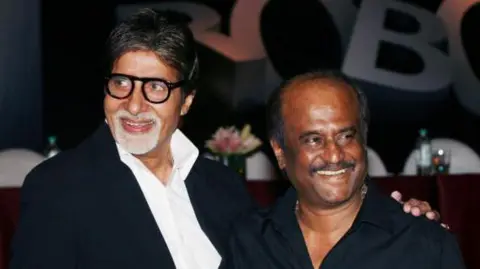 Getty Images
Getty ImagesA recent report, which details poor working conditions and rampant sexual harassment faced by women in Malayalam-language cinema, is causing seismic upheavals in the entertainment industry in India.
But the messages of solidarity and support have come largely from women - and critics say the silence of powerful men, including India's biggest and most loved stars, is deafening.
Based on testimonies from 51 people from the Kerala-based film industry, the Hema Committee report lays bare decades of exploitation and says that “women have been asked to make themselves available for sex on demand” and that they were constantly told to make “compromise and adjustments” if they wanted work.
The panel was set up in 2017 after Women in Cinema Collective (WCC), formed by a group of women working in the Malayalam cinema, petitioned the government after a top actress was sexually assaulted by a group of men allegedly at the behest of a top male actor.
Their 290-page report was released last month, with chunks redacted to hide the identities of the survivors and those accused of harassment.
But since its release on 19 August, several women have publicly spoken up about their ordeal and more than a dozen police complaints have been lodged against male stars, producers, directors and other influential men.
The state government has set up a special investigation team (SIT) to look into the allegations and the Kerala high court has asked the SIT to investigate the instances mentioned in the report, raising hopes that the survivors may after all get justice.
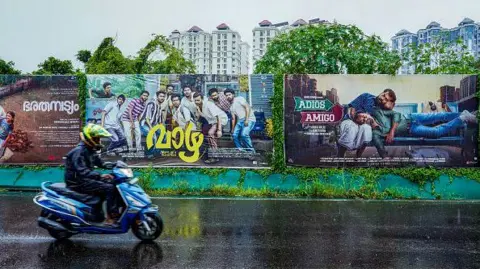 Getty Images
Getty ImagesWomen in all Indian film industries, including in the biggest and hugely popular Bollywood, have repeatedly spoken about the casting couch – the practice of men asking for sexual favours in return for roles – and rampant sexual harassment they face.
“The rot is as deep as the ocean across all Indian film industries,” film critic and author Shubhra Gupta told the BBC. “We won’t find a single female performer anywhere in the country who has not suffered. If everyone came out to complain, it will take us many decades to deal with all those complaints.”
The sordid revelations about the extent of the rot in Malayalam cinema have made headlines and the findings have been debated on primetime TV. Deedi Damodaran, a WCC member, told the BBC that the response has been “overwhelming”.
“Some women have now talked about how they had to flee the industry because of the terrible things that happened to them. They have no evidence, but they’ve got some sort of closure by talking about their experiences.”
Many of them, she says, have spoken out despite being trolled and abused on social media.
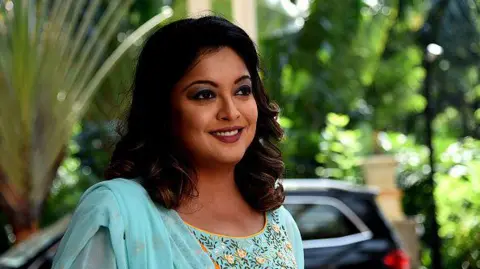 Getty Images
Getty ImagesThe report has also created ripples in other film industries, with calls for reform being heard in regional industries based in Tamil Nadu, Andhra Pradesh, Telangana and Karnataka.
In Telangana, pressure has grown on the government to publish a report on the Telugu film industry that’s been waiting to see the light of the day for two years. An inquiry was instituted after an upcoming actress, Sri Reddy, protested by stripping down to her undergarments in public in 2018 “to draw attention to the sexual exploitation of women in the industry”.
West Bengal has set up a committee to investigate allegations of sexual abuse in the Bengali film industry, actress Ritabhari Chakraborty has said. This, she added, would “cleanse the industry from predators”.
Women in Tamil and Kannada cinema have also petitioned their state governments to improve working conditions for them.
Veteran Tamil actress Radhika Sarathkumar told the BBC that the Hema committee report has created a lot of awareness and that “men will be scared now”.
“It's time women in cinema get together and speak up and stop this nonsense,” she said.
But the lack of support from the men in the industry, says Damodaran, has been disappointing.
Malayalam superstars Mohanlal and Mammootty have welcomed the report but said that nothing should be done to hurt the industry.
“These heroes are worshipped as larger than life beings, but we’re waiting for them to take a heroic stand,” Damodaran told the BBC.
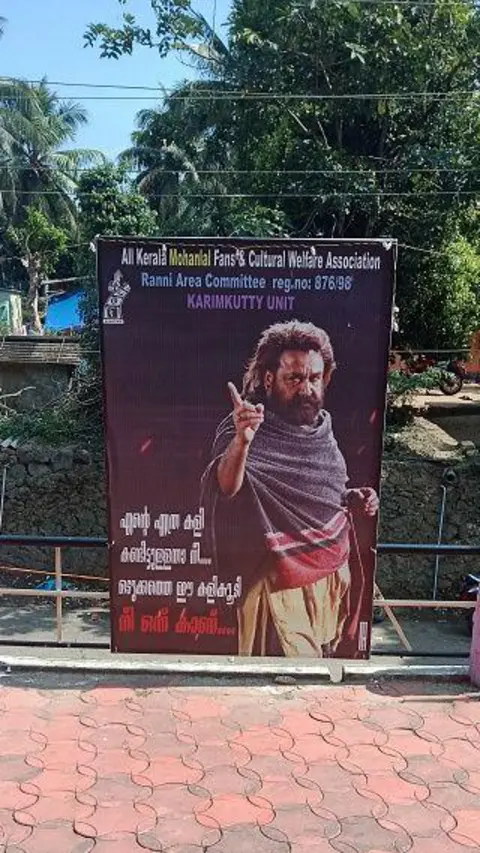 Getty Images
Getty ImagesIn Tamil Nadu, actor-politicians Kamal Haasan and Vijay's silence has been noted, while Rajinikanth faced criticism for claiming ignorance of the report 10 days after its release.
“The harassment happens to each of us, how come men don’t know about it? Maybe the male actors compartmentalise, maybe they choose not to see it,” Sarathkumar told the BBC. “It's very sad that every time the onus in on the women to protect themselves.”
Some have also pointed out that the biggest names in Bollywood - Amitabh Bachchan, Shah Rukh Khan, Salman Khan, Aamir Khan and Akshay Kumar - have chosen to remain silent.
Gupta says their silence may be deafening, but it’s not unexpected. “I would’ve been very surprised if there had been a reaction. We saw what happened in 2018 after the #MeToo movement first started in Bollywood after actress Tanushree Dutta accused an actor of behaving inappropriately towards her on a film set in 2008."
"For a while, there was a groundswell of support and it seemed that Bollywood would step up and do something about it. But then things were contained. None of the men suffered any consequences, they are all back to doing what they did. In fact, the women who complained didn’t get work.”
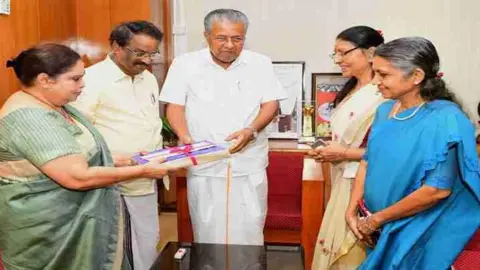 Chief Minister's Office
Chief Minister's OfficeA key criticism of Bollywood is that, unlike other industries, none of its leading actresses have addressed gender issues.
Dutta, who received little support from her A-lister peers and has since claimed that she has been denied work, has described the Hema committee report as “useless”, adding that earlier reports about making workplaces safer for women had not helped.
Gupta says one of the reasons why stars don't speak out could be to avoid trouble for themselves.
“ I think they keep quiet because they know the stakes are high, they are fearful of not getting work in the industry. Remember the time when Aamir Khan or Shahrukh Khan spoke about intolerance? They got trolled heavily and lost out on work."
Damodaran, however, says the response to the report has given her cause for optimism.
“Film industries in India are deeply patriarchal and misogynistic. But we can’t continue with the kind of sexism and misogyny that women have to face in their workplace. Things are bound to change - and they must.”
